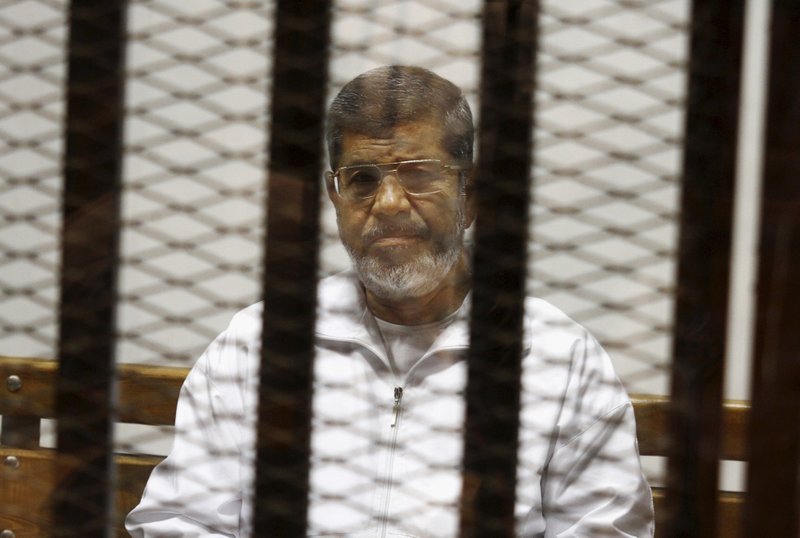CAIRO -- Egypt's first democratically elected president, Islamist leader Mohammed Morsi, who was ousted by the military in 2013 after a year in office, collapsed in court while on trial Monday and died, state TV and his family said.
The 67-year-old Morsi had just addressed the court, speaking from the glass cage where he is kept during sessions and warning that he had "many secrets" he could reveal, a judicial official said. A few minutes later, he collapsed in the cage, the official said, speaking on condition of anonymity because he was not authorized to talk to the press.
In his final comments, he continued to insist he was Egypt's legitimate president, demanding a special tribunal, one of his defense lawyers, Kamel Madour told The Associated Press. State TV said Morsi died before he could be taken to the hospital.
Morsi's Muslim Brotherhood accused the government of "assassinating" him through years of poor prison conditions. Morsi, who was known to have diabetes, had been imprisoned since his 2013 ouster, often in solitary confinement and barred from visitors -- his family was allowed to visit only three times during that time. Egypt's chief prosecutor said Morsi's body would be examined to determine the cause of his death.
It was a dramatic end for a figure who was central in the twists and turns taken by Egypt since its "revolution" -- from the pro-democracy uprising that in 2011 ousted the country's longtime authoritarian leader, Hosni Mubarak, through controversial Islamist rule and now back to a tight grip under the domination of military men.
The Muslim Brotherhood, Egypt's most powerful Islamist group, won the elections held after Mubarak's fall, considered the first free votes the country had seen. First, they gained a majority in parliament, then Morsi squeaked to victory in presidential elections held in 2012, becoming the first civilian to hold the office.
Critics accused the Brotherhood of using violence against opponents and seeking to monopolize power and Islamize the state. Massive protests grew against their rule, until the military -- led by then-Defense Minister Abdel-Fattah el-Sissi -- ousted Morsi in July 2013, dissolved parliament and eventually banned the Brotherhood as a "terrorist group."
El-Sissi was elected president and re-elected in 2018 in votes that human-rights groups sharply criticized as undemocratic. He has waged a ferocious crackdown that crushed the Brotherhood but also almost all other dissent, arresting tens of thousands, banning protests and silencing most criticism in the media.
Since his ouster, Morsi and other Brotherhood leaders have been put on multiple and lengthy trials. Morsi was sentenced to 20 years in prison on charges of ordering Brotherhood members to break up a protest against him, resulting in deaths. Multiple cases are still pending. Monday's session was part of a retrial, held inside Cairo's Tora Prison, on charges of espionage with the Palestinian Hamas militant group.
Morsi was held in a special wing in Tora nicknamed Scorpion Prison. Rights groups say its conditions fall far below Egyptian and international standards.
In contrast, Mubarak was allowed to stay in a military hospital during trials on various charges -- of which he was eventually cleared and allowed free.
Sarah Leah Whitson, Middle East director with Human Rights Watch, said in a tweet that Morsi's death was "terrible but entirely predictable" given the government's "failure to allow him adequate medical care, much less family visits."
Mohammed Sudan, leading member of the Muslim Brotherhood in London, said Morsi was banned from receiving medicine or visits and there was little information about his health condition.
Freedom and Justice, the Brotherhood's political arm, said in a statement on its Facebook page that prison conditions led to Morsi's death in what amounted to "assassination."
The judicial official said Morsi had asked to speak to the court during Monday's session. The judge permitted it, and Morsi gave a speech saying he had "many secrets" that, if he told them, he would be released, but he added that he wasn't telling them because it would harm Egypt's national security.
Madour, the defense lawyer, said Morsi spoke for around five minutes, "very calm and organized," before collapsing inside the cage.
Information for this article was contributed by Sarah El Deeb, Maggie Michael and Lee Keath of The Associated Press.
A Section on 06/18/2019
